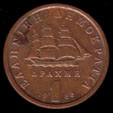Drachma
|
|
| Drachma | |
|---|---|
| Missing image 1drachma1988front.jpg Image:1drachma1988front.jpg |  |
| 1 drachma 1988 | |
Drachma, pl. Drachmas or Drachmae (δραχμή, pl. δραχμές) is the name of both:
- A modern Greek currency, introduced in 1832, and replaced by the Euro in 2001 (at the rate of 340.750 drachma to the Euro).
- An ancient currency unit found in many Greek city states and successor states, and in many middle-eastern kingdoms of the Hellenistic era.
The name Drachma is derived from the verb "δράττω" (dratto, to grasp). Initially a drachma was a fistful (a "grasp") of 6 oboloi, sticks of metal used as currency as early as 1100BC.
Tetradrachma_från_Aten_(omkr_490_fKr,_ur_Nordisk_familjebok).png
The 5th century BC Athenian tetradrachm ("four drachmae") coin was the most widely used coin in the Greek world prior to Alexander the Great. It featured the helmeted profile bust of Athena on the obverse (front) and an owl on the reverse (back). The reverse is featured on the national side of the Greek 1 euro coin, see Greek euro coins.
After Alexander the Great's conquests, the name Drachma was used in many of the Hellenistic kingdoms in the Middle East, including the Ptolemaic kingdom in Alexandria. The Arabic unit of currency known as dirham (in the Arabic language, درهم), known from pre-Islamic times and afterwards, inherited its name from the drachma; the dirham is still the name of the official currencies of Morocco and the United Arab Emirates. The Armenian dram also derives its name from the drachma.
The drachma was also used in Ancient Rome in the 3rd century BC. It is difficult to give even comparative values for money from before the 20th century, due to vastly differing economies. Classical historians regularly say that in the late Roman Republic and early Roman Empire, the daily wage for a laborer was one Drachma.
The drachma was reborn in 1832, soon after the establishment of the modern state of Greece. In 1868 Greece joined the Latin Monetary Union and the drachma became equal in weight and value to the French franc. During the German occupation of Greece (1941-1944), catastrophic hyperinflation and Nazi looting of the Greek treasury made the drachma practically worthless; in 1944, old drachmae were exchanged for new ones at the ratio of 50,000,000,000 to 1. The new currency was soon devaluated again; in 1953, in an effort to halt the slide, Greece joined the Bretton Woods system. In 1956 notes were again exchanged for new ones, at a ratio of 1,000 to 1; the new notes were pegged at 30 drachmae = 1 US dollar.
In 1973, the Bretton Woods System was abolished; over the next 25 years the official exchange rate gradually declined, reaching 400 GRD = 1 USD.
Greece joined the European Economic and Monetary Union, on 1 January 2001, and exactly one year later, the drachma was officially replaced by the Euro at a rate of 340.75 drachmas to the Euro. The coins continued to be exchangeable into Euros until March 1, 2004. The banknotes will continue to be exchangeable until March 1, 2012.
The ISO 4217 code for the Drachma is GRD; The currency sign is ₯ (Unicode character code #x20AF).
Coins in circulation at the time of the adoption of the Euro [1] (http://www.bankofgreece.gr/en/Banknotes/coins.htm)
- 50 Lepta (.147 Eurocents)
- 1 Drachma (.293 Eurocents)
- 2 Drachmae (.587 Eurocents)
- 5 Drachmae (1.47 Eurocents)
- 10 Drachmae (2.93 Eurocents)
- 20 Drachmae (5.87 Eurocents)
- 50 Drachmae (14.67 Eurocents)
- 100 Drachmae (29.35 Eurocents)
- 500 Drachmae (1.47 Euros)
Banknotes in circulation at the time of the adoption of the Euro [2] (http://www.bankofgreece.gr/en/Banknotes/banknotes.htm)
- 100 drachmae (29.35 Eurocents)
- 200 drachmae (58.69 Eurocents)
- 500 drachmae (1.47 Euros)
- 1000 drachmae (2.93 Euros)
- 2000 drachmae (5.87 Euros)
- 5000 drachmae (14.67 Euros)
- 10,000 drachmae (29.35 Euros)
Historic currency divisions
- 6 obols = 1 drachma
- 100 drachmae = 1 mina (or mna)
- 60 minae = 1 Athenian Talent (Athenian standard)
Minae and talents were never actually minted: they represented weight measures used for commodities (e.g. grain) as well as metals like silver or gold
Modern currency divisions
- 100 lepta = 1 drachma
External link
- Overview of the modern Greek drachma from the BBC (http://news.bbc.co.uk/hi/english/static/in_depth/business/2001/euro_cash/spent_currencies/drachma.stm)Template:PreEuroCurrencies
bg:Драхма de:Drachme el:Δραχμή es:Dracma fr:Drachme it:Dracma nl:Drachme pt:Dracma ro:Drahmă tr:Drahmi
